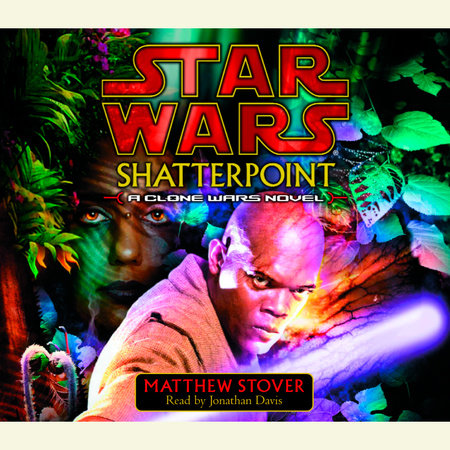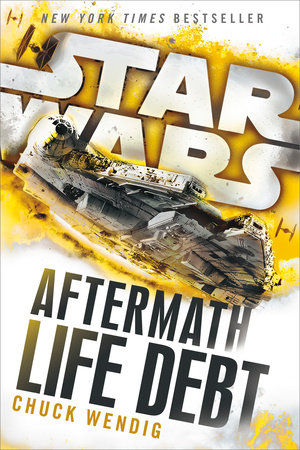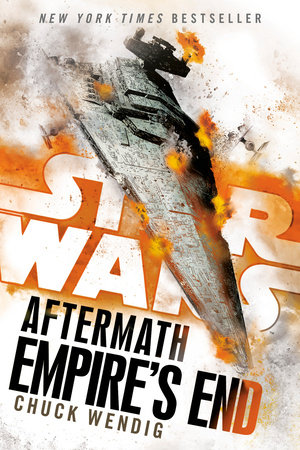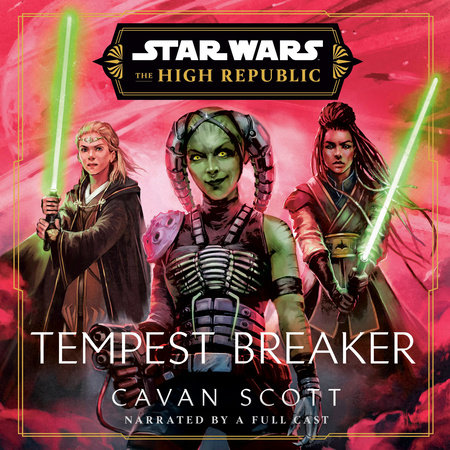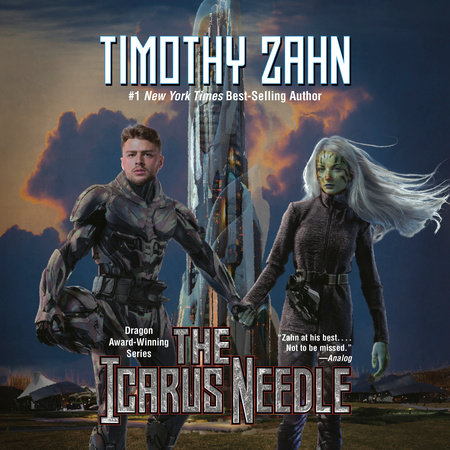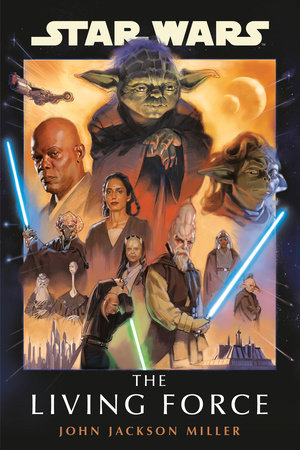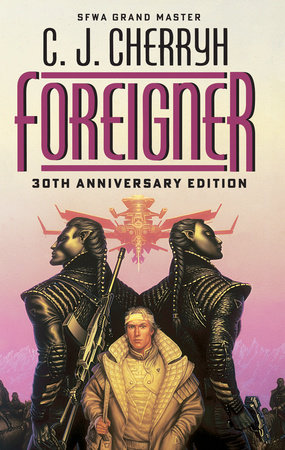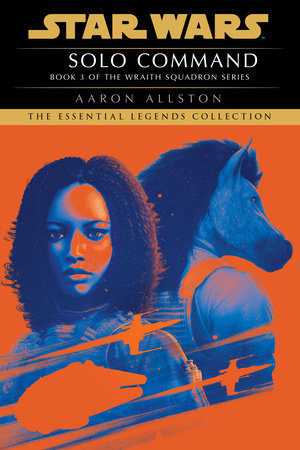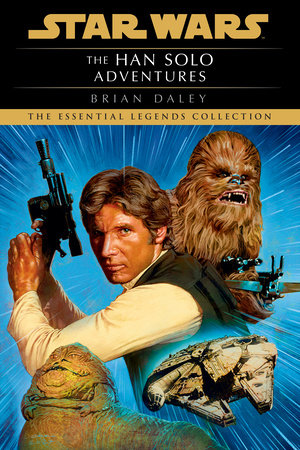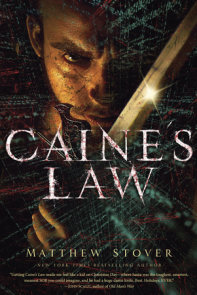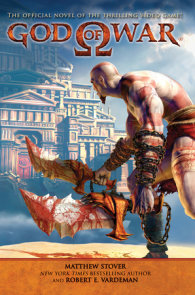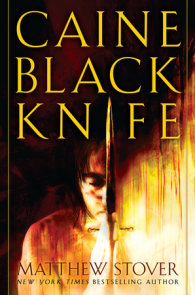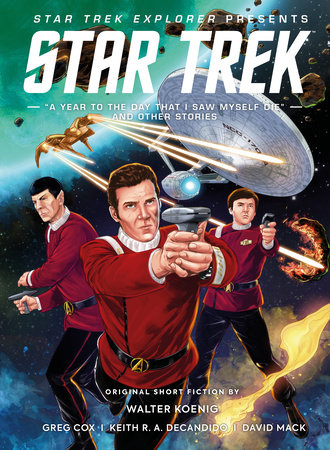Author Q&A
Interview with Matthew Stover, author of Star Wars Shatterpoint
Del Rey:Shatterpoint is the first novel in a new series to be set during the Clone Wars; that is, between movie Episodes II and III. What can you tell us about the novel, and about the series? Will this be an ongoing project of sequential novels like the New Jedi Order?
Matthew Stover:The New Jedi Order was a pure publishing project: a single massive story—virtually one huge novel spread across multiple volumes—told by a succession of authors. For the NJO, we each had an outline of the overall story; we knew where it was going, and we knew what each of our parts of it were supposed to be. The Clone Wars are, in some ways, a lot bigger—not only do we have the Del Rey hardcovers and paperbacks, there are all kinds of other media involved as well: the Scholastic young adult books, comics from Dark Horse, video games, action figures, toys . . . And all these products have to interlock not only with each other, but (most important) fit into the continuity of the Prequel Trilogy—and Mr. Lucas is keeping those cards close to his vest.
So in a sense, the authors of all these projects are in a similar situation to the characters themselves: We are forced to feel our way forward, concentrating on what’s directly in front of us, without any detailed knowledge of how it will all turn out . . .
What I can tell you about the novel itself is this: It’s not for kids. The young adult stories are coming out from Scholastic. Shatterpoint is definitely PG-13.
DR:No one under seventeen admitted without a parent or guardian?
MWS:Well, not exactly! But when I originally agreed to write a novel featuring Mace Windu, I thought it was supposed to be a traditional Star Wars book: My initial outline featured Mace being forced to team up with a dashing, cynical mercenary and a strong-willed warrior woman to fight an unexpected threat to the Republic coming out of Hutt space—complete with exotic aliens, fast starships, and a funny droid for comedy relief . . .
But that wasn’t what LucasBooks had in mind at all. They came back to me asking for something darker and deeper, more psychological, more focused on the horrors of war—literally, the phrase used was: "a Star Wars novel with the feel of All Quiet on the Western Front."
All Quiet is, of course, one the classics of world literature. Talk about raising the bar . . . But I’ve never been one to back down from a challenge. As Mace would say: "I don’t have to win. All I have to do is fight."
DR:Is this the first Star Wars novel to feature Mace Windu as the main character?
MWS: It had better be. That’s what they hired me for!
DR:Give us your thoughts on Mace. Did you base your portrait of him in the novel on Samuel L. Jackson’s screen performances, or did you find inspiration for his character elsewhere?
MWS: I based the feel of him on Mr. Jackson’s performance; to round out the character, I drew from a number of other sources—the Essential Guide to Characters, his portrayal in the comics and in other bridge novels from the Prequel era, and from one particularly telling detail: At the time of The Phantom Menace, Mace Windu was only forty years old, yet he was one of only two Senior Members of the Jedi Council—the other being, of course, Yoda, who was pushing nine hundred and was known as one of the wisest and most powerful Jedi in the twenty-five-thousand-year history of the Order.
What kind of man could be considered Yoda’s equal? What kind of man would have the same rank, and the same authority, as one of the greatest Jedi of all time?
That was one of the questions I set out to answer in Shatterpoint.
DR:What is the significance of the novel’s title?
MWS:I can’t answer that directly; like the titles of most of my books (huh—even most of my chapters), the meaning of the title develops along with the story itself. In literal terms, the best description is the one Mace offers in the journal entry that forms part of the Introduction:
"I can see shatterpoints.
"The sense is not sight, but ‘see’ is the closest word Basic has for it: it is a perception, a feel of how what I look upon fits into the Force, and how the Force binds it to itself and to everything else . . . . The Force shows me strengths and weaknesses, hidden flaws and unexpected uses. It shows me vectors of stress that squeeze or stretch, torque or shear; it shows me how patterns of these vectors intersect to form the matrix of reality.
“Put simply: when I look at you through the Force, I can see where you break."
DR:In the novel, Mace is a master of a lightsaber technique called Vaapad. What is this technique? Is it your own invention? I know that you are a martial artist yourself . . .
MWS:I am indeed, but I’m not a Jedi. Vaapad appears in a number of references to Mace; I’m not sure who originated the concept.
All I did with Vaapad was take published descriptions of this style and expand them into the details of a fighting system that bears some relationship to actual combat, given the constraints and abilities of Jedi and the ways in which we’ve seen them use the Force.
DR:You’ve mentioned All Quiet on the Western Front. Mace’s journey to find his former Padawan, Depa Billaba, in the jungles of the planet Haruun Kal reminded me of another classic: Joseph Conrad’s Heart of Darkness. Was that novel a model for you?
MWS:Absolutely. As was Francis Ford Coppola’s superb film, Apocalypse Now, which was also inspired by Heart of Darkness. In fact, that’s how I pitched the concept of Shatterpoint to Del Rey and LucasBooks: "How about if I did Apocalypse Now with Jedi?" Very much to my surprise, everybody liked the idea.
That being said, however, I have to say that Shatterpoint has a great deal more to do with Star Wars than it does with Conrad’s novel or Coppola’s film. It is absolutely grounded in the consensual reality of the Galaxy Far, Far Away. Having read the book or seen the movie won’t give anything away about Shatterpoint. It’s not a re-telling of those tales; those stories provided a premise, that’s all. Not even a starting point; more like a background . A feel.
It’d be impossible to capture the feel of All Quiet on the Western Front in a novel starring Mace Windu; All Quiet is a tragic coming-of-age story. Heart of Darkness, on the other hand, is about what happens to mature, idealistic, moral human beings who have gone too far beyond the boundaries of civilization. So is Shatterpoint— but that’s not all it’s about.
DR:Yes, I didn’t mean to suggest that Shatterpoint is a straight retelling of Heart of Darkness. For one thing, unlike Conrad’s hero, Marlow, who is traveling into Africa, a place he’s never been before, Mace is returning home, to the world—and the people, the Korunnai—he hasn’t seen since infancy. So in a way, Mace is not only looking for Depa, he’s looking for himself, isn’t he?
MWS:Yup. Though he doesn’t know it.
DR:Depa is sent to Haruun Kal because of the planet’s importance to the Republic in the Clone Wars, but once she gets there, she becomes embroiled in an older war. What is the background of this conflict, called the Summertime War?
MWS: You can think of it in terms of the Indian Wars of the American westward expansion: two ethnically distinct populations in competition for the same land, for incompatible uses. Very few pitched battles; it’s mostly a little sputtering guerrilla conflict punctuated by occasional atrocities on both sides.
DR:Depa is suspected of having turned away from her Jedi training and embraced the dark side. I guess that makes her the Kurtz character in my Heart of Darkness analogy.
MWS:Yes, she’s who Mace is looking for—but, again in contrast with the Marlow of Heart of Darkness, who’s picking up a stranger, an ivory agent who’s become "unreliable," and the Marlow of Apocalypse Now, who’s traveling upriver to assassinate another stranger, a rogue Green Beret—Mace goes to Haruun Kal in search of a woman he has known for her entire life: a woman he raised, a woman he trained, a woman who had become his partner and his best friend. A woman who is the daughter he can never have.
It gives the story a bit of a different spin, if you see what I mean.
DR:Speaking of different spins, in your last Star Wars novel, Traitor, you showed readers a side of the Force that they hadn’t seen before . . .
MWS:I don’t think it was so much that readers hadn’t seen that particular side of the Force as it was that many of them had never thought about it in quite the way I presented it. A lot of them were very uncomfortable with the concept of there being no simple answers . . .
DR:You’re doing something similar here with the Korunnai and their use of pelekotan. Is pelekotan another name for the Force? Is it the dark side of the Force?
MWS:Pelekotan is the word for the Force in the local language, Koruun. For the rest, well . . . I’m not gonna tell you. I have a feeling there might be some debate over this. Debate is good.
DR:The character of Kar Vastor is likely to be at the center of that debate. He’s Mace’s nemesis, yet I wouldn’t exactly call him evil . . . Or is he?
MWS:Depends on what you mean by evil. He does things that would be, under ordinary circumstances, unforgivably bad—but the circumstances are far from ordinary. How far would you go, to save your people from genocide?
DR:You’ve obviously spent a lot of time thinking about the Force. How has your understanding of the Force evolved through your writing? Do you ever find yourself applying that understanding, or the philosophy behind it, in real life?
MWS:Every day. It would be misleading to say "I believe in the Force," in the same sense that it would be misleading to say "I believe in the sun." Give it whatever name you like—the Force, the Tao, the Holy Spirit, the Universal Mind—I see it in action everywhere I look, both in the world and in myself. Perhaps the most significant thing George Lucas did in creating Star Wars was to fictionalize the Tao—to spark a universe where we can talk about the Force in objective terms and show it in direct action. This is probably the most important feature of fantastic fiction: the ability to directly address spiritual and moral issues without imposing an existing theology upon them.
And one of the coolest things about the Prequel films so far is that Mr. Lucas has shown us how beings of good will can legitimately disagree about what the Force "is" and what it "wants"—I’m thinking of Qui-Gon here, and his arguments before the Council—and how both sides can be right . . .
DR:Are you going to be doing any signings or convention appearances in connection with Shatterpoint?
MWS: As of right now, I’m told Del Rey is taking me to the San Diego Comicon in the middle of July and some stores around the American Midwest in late June. Whether I hit any additional cons will depend largely on the healthy progress of my finances. I mean, sure, cons are fun and even useful in promotional terms, but they’re also expensive, and I have a family to support . . .
DR:You’re also the author of two highly acclaimed fantasy novels featuring Caine, the actor and assassin: Heroes Die and Blade of Tyshalle. Are there going to be more books in this series?
MWS:I am hard at work already on the third of the Acts of Caine: Caine Black Knife. Like the first two, this novel will be a stand-alone. I’m not a fan of most Endless Storyline fantasy series—in fact, I’m not a fan of any of them. I think the Acts of Caine are most profitably read in order of publication, but each one is a complete novel, and they can really be read in any order.
I have a sketch for a trilogy set in the Earth/Overworld universe, but if that comes along, it will be clearly labeled as such. And, y’know, Blade of Tyshalle is as long as some trilogies, but that kinda happened by accident. My agent said, "Matt, if you’re going to write a multi-book story, you need to tell me in advance, so I can sell it as one."
DR:Will there be more Star Wars novels from Matt Stover?
MWS: Ask Del Rey and LucasBooks. Though I’ve done two Star Wars books in a row, and I need to take a break to get back to my own universe for a few months, I like Star Wars. I also like the money it pays, and the exposure it gets. I know some writers look at media tie-ins mostly as ways to get the bills paid; for me, it’s different. If anything, I take Star Wars more seriously than I do my own stuff. It is a privilege to tell stories in Mr. Lucas’ universe, and a somewhat stressful honor to have these stories read by hundreds of thousands of (sometimes nitpicky and occasionally outright rabid) fans. After that, writing Caine again is like a vacation . . .
